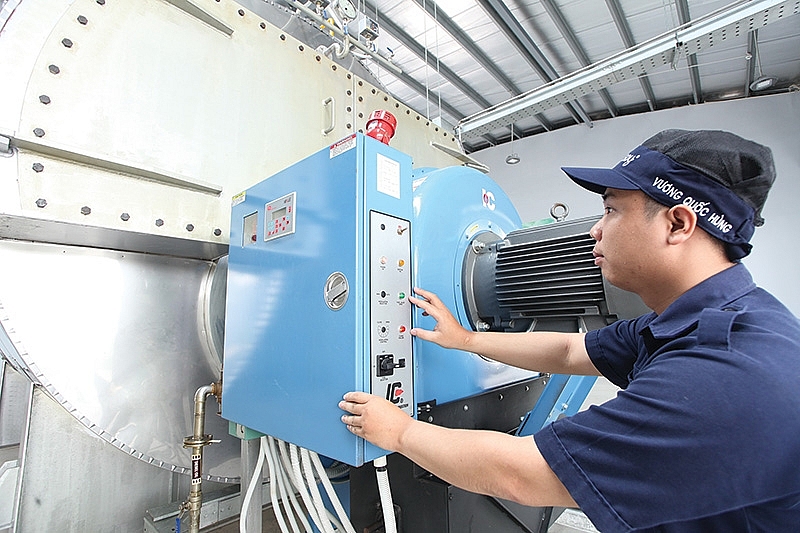US-led boost to private sector funding
 |
| Private sector financing strategies are currently in the sights of groups like OPIC and the Asian Development Bank, Photo: Le Toan |
During his working visit to Vietnam last week, Eric Jones, chief of staff at the corporation (OPIC), told VIR that they are seeking potential private partners in Vietnam to provide concessional loans to. The global investment portfolio of OPIC has increased from an initial $29 billion to $60 billion now.
“We can provide loans worth from $350 million to $500 million per project, provided that the project is bankable,” Jones said.
To be eligible for OPIC financing, applicants must have a commercially viable business plan and successful track record.
“If Vietnamese businesses have bankable projects, they can come to us. After they are proven feasible, they can access our loans,” Jones said.
Loan tenures can last as long as 20 years. So far, OPIC has almost $4 billion invested in over 100 projects across the Asia-Pacific region.
“Vietnam is one of the primary nations that OPIC wants to work with to expand business and investment,” Jones said. “We currently focus our financing for the private sector in Vietnam on projects of digital connectivity, infrastructure, energy, IT, construction of smart cities, agriculture, healthcare, and education and training.”
As the US government’s development finance institution, initially OPIC supported American businesses investing in emerging markets to address critical development challenges from access to clean water and electricity to housing, education, and access to finance. However, currently, OPIC has also been seeking to support overseas enterprises regardless of ownership form.
“Fast-industrialising Vietnam has great demand for developing infrastructure and energy sources, especially renewables. The Vietnamese government is facilitating private enterprises to engage in these projects, which is a good opportunity for us,” Jones said.
According to the Ministry of Transport (MoT), Vietnam would need about $48 billion to develop its transport infrastructure during 2018-2022. About VND651 trillion ($28.3 billion) of this is for roads, while other works also need huge capital, including railways ($5.4 billion), air ($4.6 billion), maritime ($3.1 billion), and inland waterways ($1.5 billion). About $14 billion of this will be mobilised from private companies, especially foreign sources.
“We call for all investors and funders to invest in infrastructure projects in Vietnam, making the country a more attractive investment spot,” said Minister of Transport Nguyen Van The at a recent conference on regional transport connectivity.
Over the past four decades, Vietnam has emerged as a model for navigating change and adapting to an increasingly connected world. By building a diversified economy that spans agricultural products and advanced IT equipment, today Vietnam is one of the largest exporters in the world. Last year, the economy grew by 7.08 per cent, the highest since 2008. The rate is 6.79 per cent in the first quarter of this year.
“The same factors that propelled this sustained economic miracle, including a hardworking population, a government committed to attracting investment, and investors who recognised a significant opportunity, will support the country’s next phase of growth,” Jones said.
“Like many of the emerging economies of the Indo-Pacific, Vietnam requires significant investment to support a growing population that is increasingly living and working in urban areas, using modern technology, and engaging with the rest of the world.”
Last month, during his working visit to Vietnam, Tomoyuki Kimura, director general of the Strategy, Policy and Review Department of the Asian Development Bank (ADB), told VIR that under the bank’s newly-launched Strategy 2030, the ADB will extend its financing to Vietnam, with a focus on infrastructure development in collaboration with the private sector. The bank is now seeking bankable infrastructure projects invested by the private sector in Vietnam.
In 2018, the ADB approved a sum of $20 billion to finance projects across Asia. Some $16 billion of this was set aside for state-invested projects, with the remaining $4 billion being used for privately-invested projects. In Southeast Asia, Indonesia and Thailand received the most financing for private firms.
Last December, the ADB and Joint Stock Commercial Bank for Investment and Development of Vietnam signed a $300 million loan agreement to support the growth and productivity of small- and medium-sized enterprises in Vietnam.
What the stars mean:
★ Poor ★ ★ Promising ★★★ Good ★★★★ Very good ★★★★★ Exceptional
 Tag:
Tag:
Related Contents
Latest News
More News
- Hermes joins Long Thanh cargo terminal development (February 04, 2026 | 15:59)
- SCG enhances production and distribution in Vietnam (February 04, 2026 | 08:00)
- UNIVACCO strengthens Asia expansion with Vietnam facility (February 03, 2026 | 08:00)
- Cai Mep Ha Port project wins approval with $1.95bn investment (February 02, 2026 | 16:17)
- Repositioning Vietnam in Asia’s manufacturing race (February 02, 2026 | 16:00)
- Manufacturing growth remains solid in early 2026 (February 02, 2026 | 15:28)
- Navigating venture capital trends across the continent (February 02, 2026 | 14:00)
- Motivations to achieve high growth (February 02, 2026 | 11:00)
- Capacity and regulations among British areas of expertise in IFCs (February 02, 2026 | 09:09)
- Transition underway in German investment across Vietnam (February 02, 2026 | 08:00)

















 Mobile Version
Mobile Version